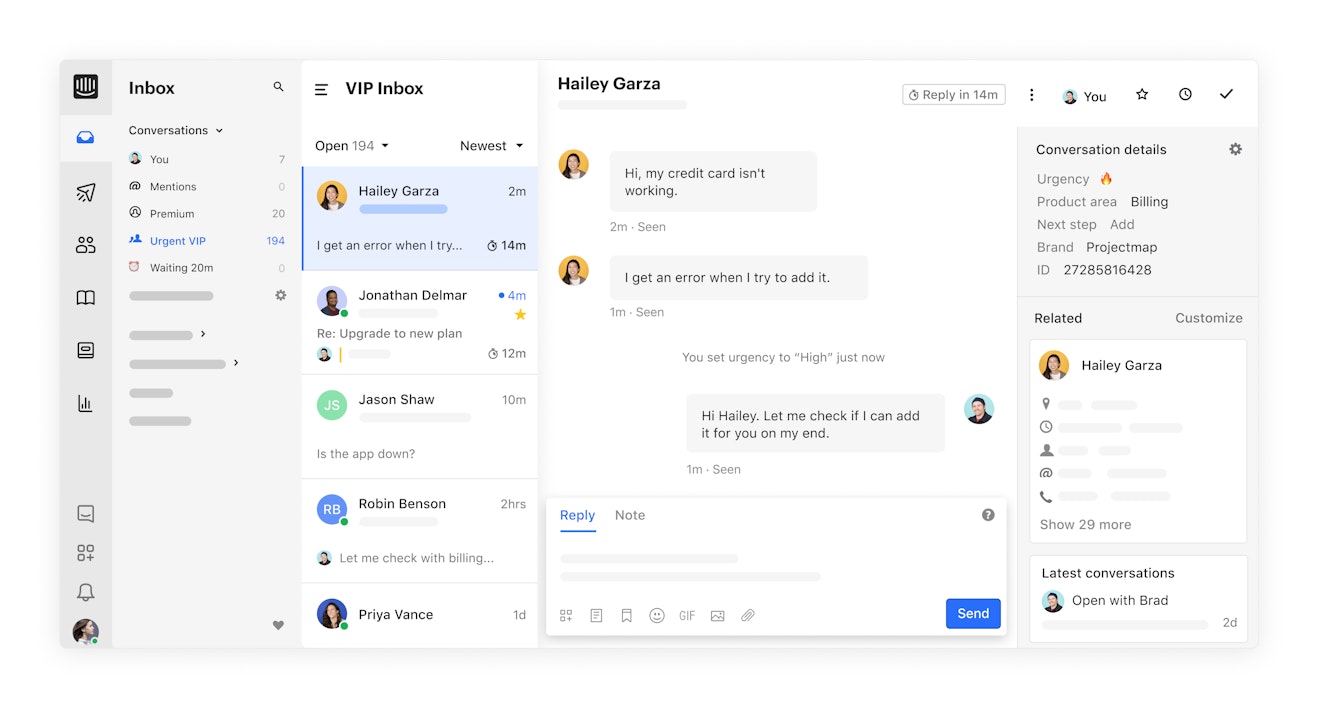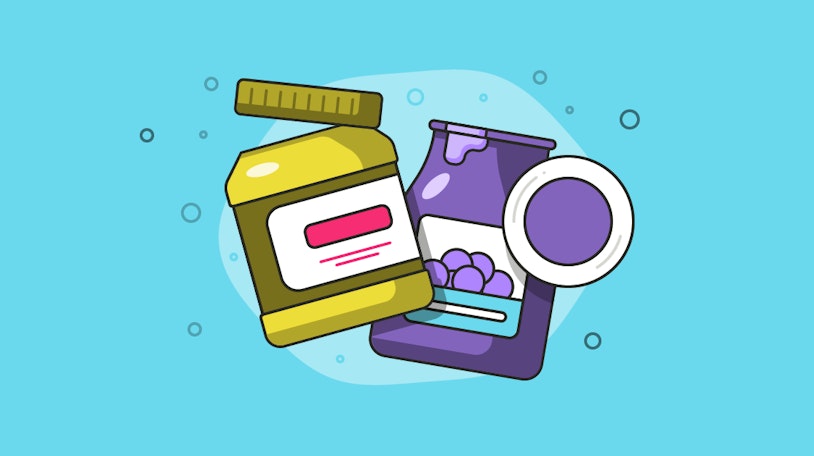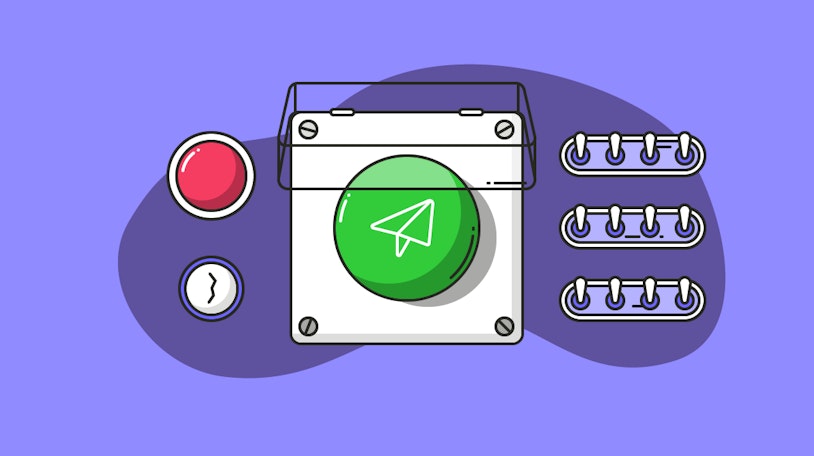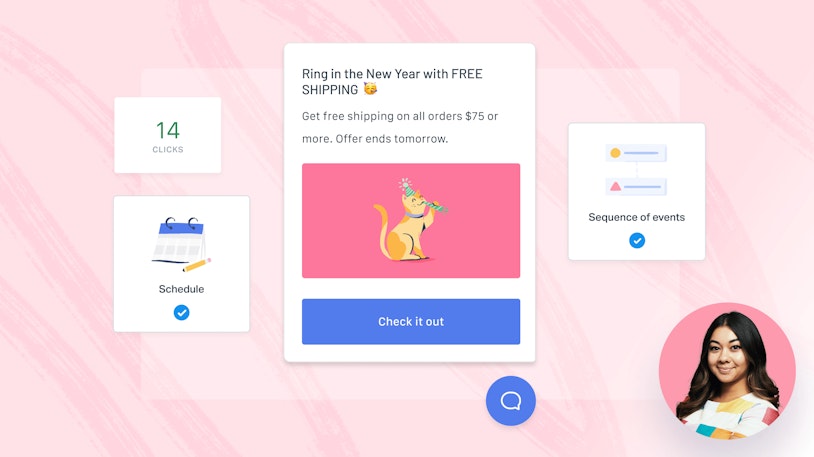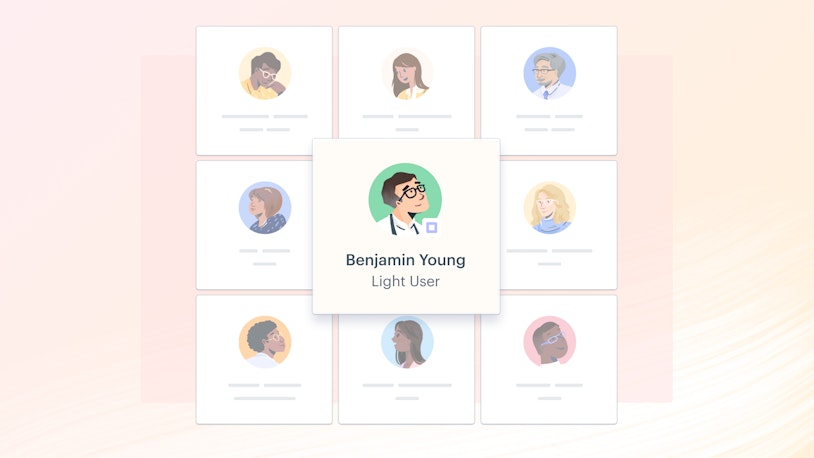In an era of constant communication, you would think connecting with customers would be easy. You can email them, text them, post on their favorite social media platform, or even go old school and pick up the phone.
Unfortunately, the ease of communicating with customers has ultimately dulled the efficacy of those messages. It’s estimated that the average person receives 98 business emails per day — how on earth are you supposed to build a meaningful relationship with your customers with that much competition for their attention?!
If this question is something your company is looking to answer, then read on. This post focuses on customer engagement: what it is, why it’s important, and which tools are available to help businesses forge better connections with their customers.
What is customer engagement?
Customer engagement is the emotional connection or relationship a customer has with a company or brand. While related, customer engagement is not necessarily:
Customer experience — the interactions and touchpoints that occur between a customer and a brand throughout the customer journey.
Customer support — the assistance provided to customers by a company to help them get the most out of a product or service.
Customer success — the process of increasing a customer’s satisfaction with a product and their overall success through education, advocacy, and outreach.
While all of the above play a part in a customer’s engagement, they don’t, in and of themselves, determine it. After all, you can be satisfied with a product, but it doesn’t necessarily mean that you follow the company that makes it on social media or feel a sense of loyalty toward the brand.
However, taking the time to build a stronger relationship with your customers and earn that loyalty is linked to more positive business outcomes. According to Gallop, “a customer who is fully engaged represents an average 23% premium in terms of share of wallet, profitability, revenue, and relationship growth compared with the average customer.”
So how do you encourage engagement?
A successful customer engagement strategy centers around providing value to your customers through personalized experiences and interactions. Personalization requires learning about your customer — who they are, how they like to communicate, the ways they prefer to interact with your product and company, and what their values and motivations are.
That may sound like a tall order, and in the past, it may have been. However, today, many of the tools we already use can provide us with the data needed to better understand and interact with our customers.
What is customer engagement software?
Customer engagement software is any application or tool used to communicate with customers, track user behavior, or analyze customer interactions with the goal of optimizing the customer journey.
Some common customer engagement tools include:
Help desks and shared inboxes — software used by customer-facing teams to manage and track customer requests.
Social media management software — an application used to create, schedule, and post content and respond to user comments across multiple social media platforms.
In-app and web messaging platforms — software used to proactively connect with customers at key points in the customer journey.
Live chat products — platforms used to chat with current and prospective customers in real time.
Chatbots — software capable of handling simple customer requests using artificial intelligence (AI) or pre-determined conversation paths.
Knowledge bases — internal or external repositories of information published to enable customers to find answers on their own.
Feedback and survey apps — software used to deliver surveys, request customer feedback, and analyze the results to inform change.
Email marketing software — applications that help teams create and manage email campaigns.
A/B testing software — platforms that let you test multiple versions of a product or experience to determine what resonates best with users.
Loyalty platforms — software for creating and managing customer rewards programs.
Reporting and analytics software — platforms designed to track and analyze user data to inform product strategy.
Some might also consider customer relationship management (CRM) systems to be a type of customer engagement solution. While it is true that some CRMs have engagement features, not all of them do.
CRMs that include multiple engagement tools fall into a different category of engagement software — the customer engagement platform.
The top 12 customer engagement software tools of 2025
Whether you’re looking for a specific tool or a complete platform, here are 12 customer engagement software options that will get you on the road to building a better relationship with your customers.
1. Help Scout
Best customer engagement software for small and mid-sized businesses.
Help Scout is a communications platform that helps teams build meaningful customer relationships. The software comes with tools that make engaging with your audience easy, no matter where they are within the customer journey.
Build stronger relationships through contextual communication
Help Scout’s platform centers around a shared inbox that helps centralize all of your customer communications in one location that is accessible to all of your employees. Easily manage multiple email addresses, social channels, and live chat conversations as a team using features like conversation assignments to create accountability, private notes and @mentions to promote collaboration, tags for organization, and collision detection to avoid stepping on each other’s toes.
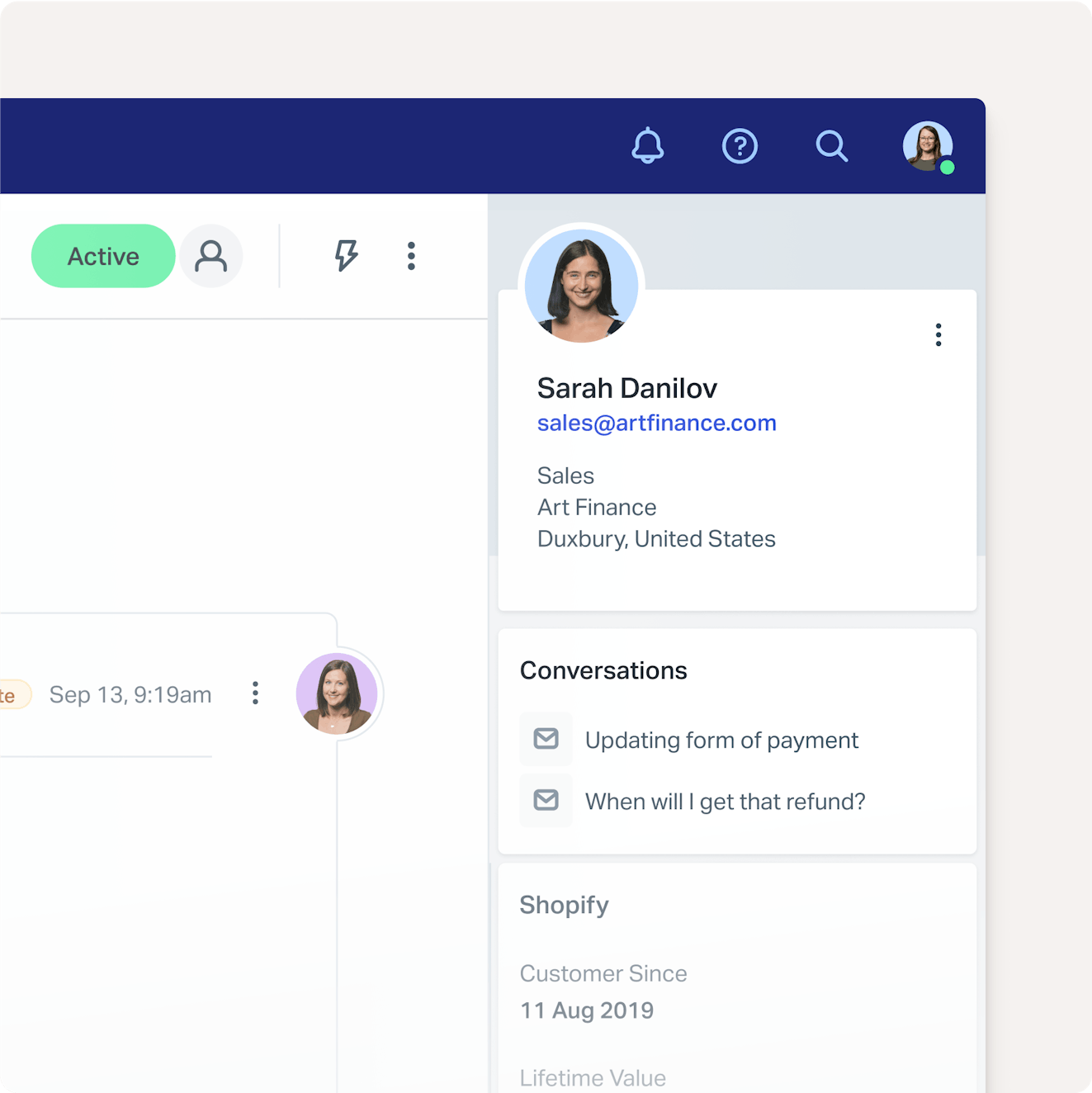
The ultimate benefit of managing all communications through Help Scout is that it facilitates contextual communication. Relevant customer information such as name, contact details, and conversation history is displayed in each conversation window, helping your team provide personalized responses. You can even create a more detailed picture by integrating Help Scout with other tools in your tech stack, such as ecommerce or business intelligence platforms.
Create a better customer experience through proactive messaging
Help Scout’s engagement widget, Beacon, allows teams to provide targeted messaging to the right customers at the right time. Help Scout offers several message types — standard, banner, and modal — which you can surface to customers based on criteria such as time-on-page, date and time, or even custom properties determined by your team.
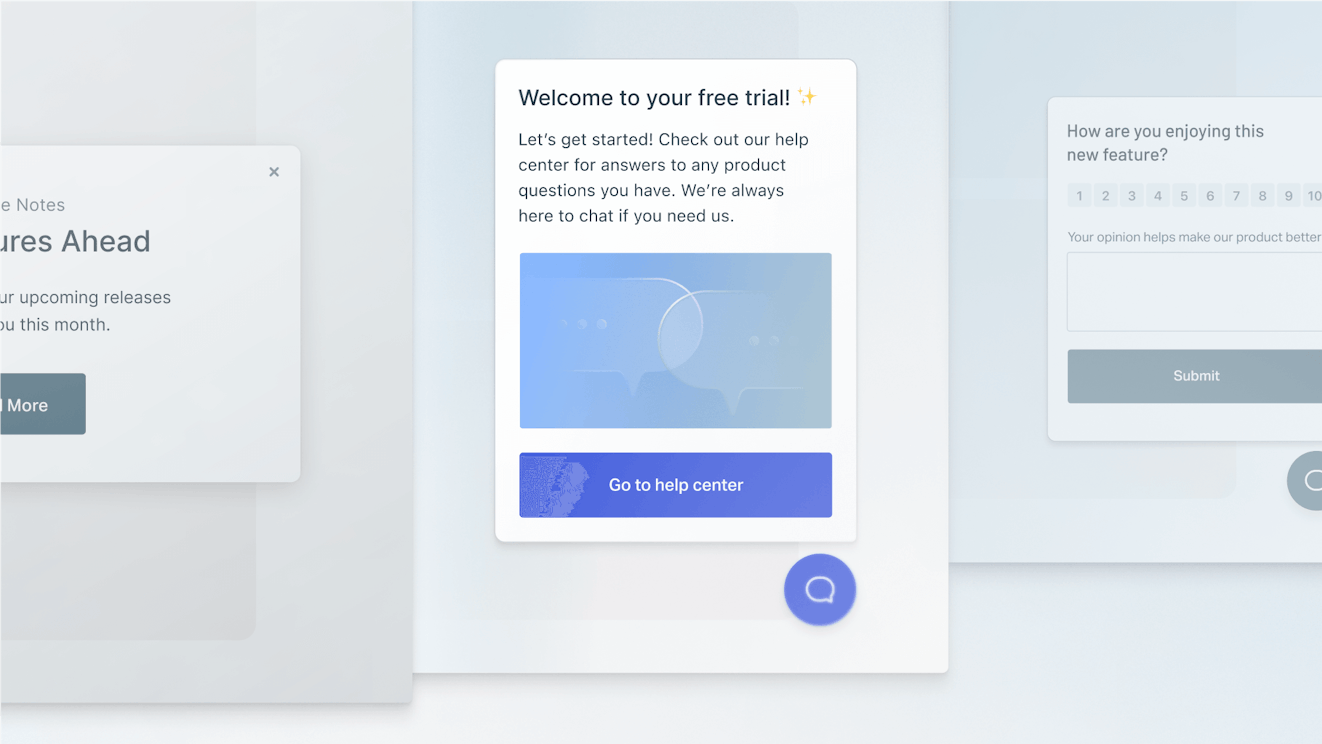
Use messages to promote a sale, announce service outages, or offer proactive support.
Collect more meaningful feedback
Another form of proactive messaging in Help Scout is the microsurveys feature. The platform offers six survey styles, including NPS, multiple choice, free form text box, or a simple thumbs up/thumbs down.
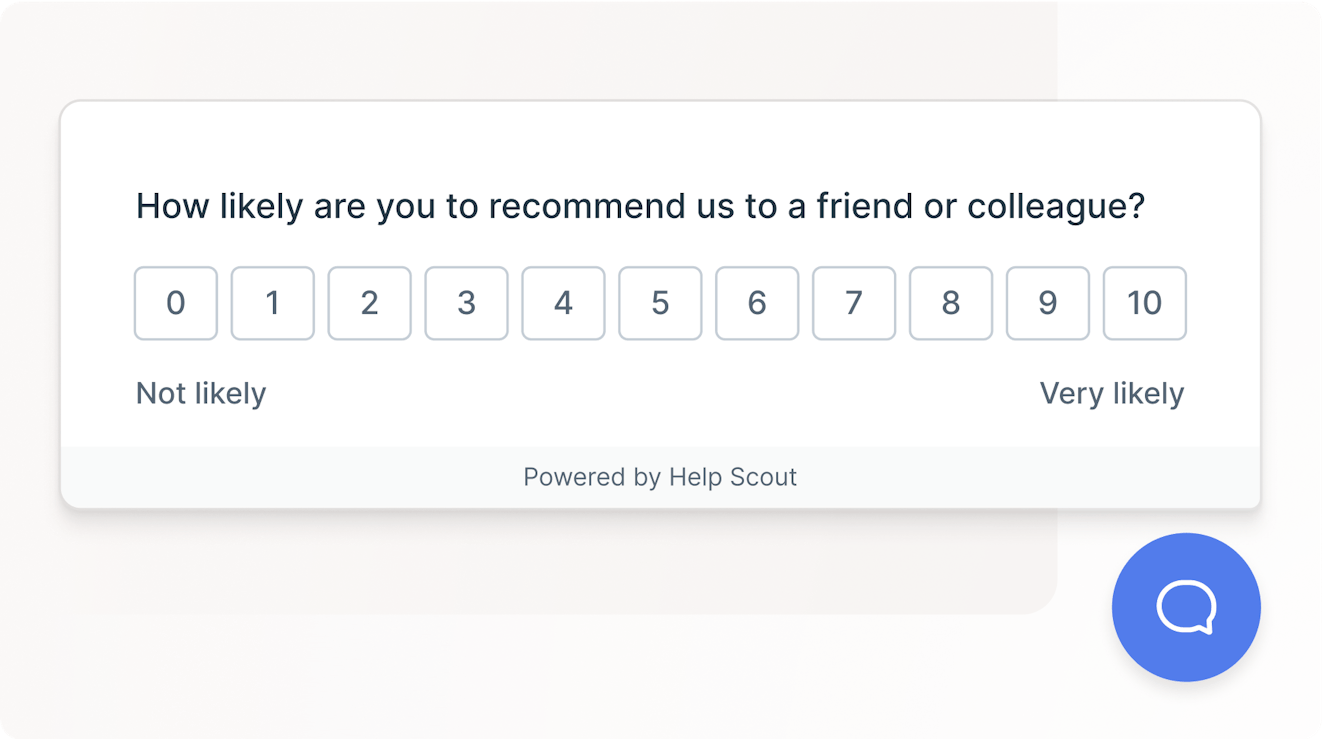
Unlike other survey products that ask for feedback after the fact, microsurveys let you reach out to customers in the moment while their observations are still fresh. Each survey you set up comes with its own dashboard containing the results and valuable insights such as the response rate and an activity report.
Improve customer engagement through self-service
Not all points of engagement with your company involve back-and-forth communication. Help Scout’s knowledge base solution, Docs, provides a way for your customers to find answers on their own.
Docs’ intuitive UI, WYSIWYG editor, and code-free customization options make the product accessible to everyone. For more technical teams, Docs allows you to use CSS to make your help center feel even more personalized.
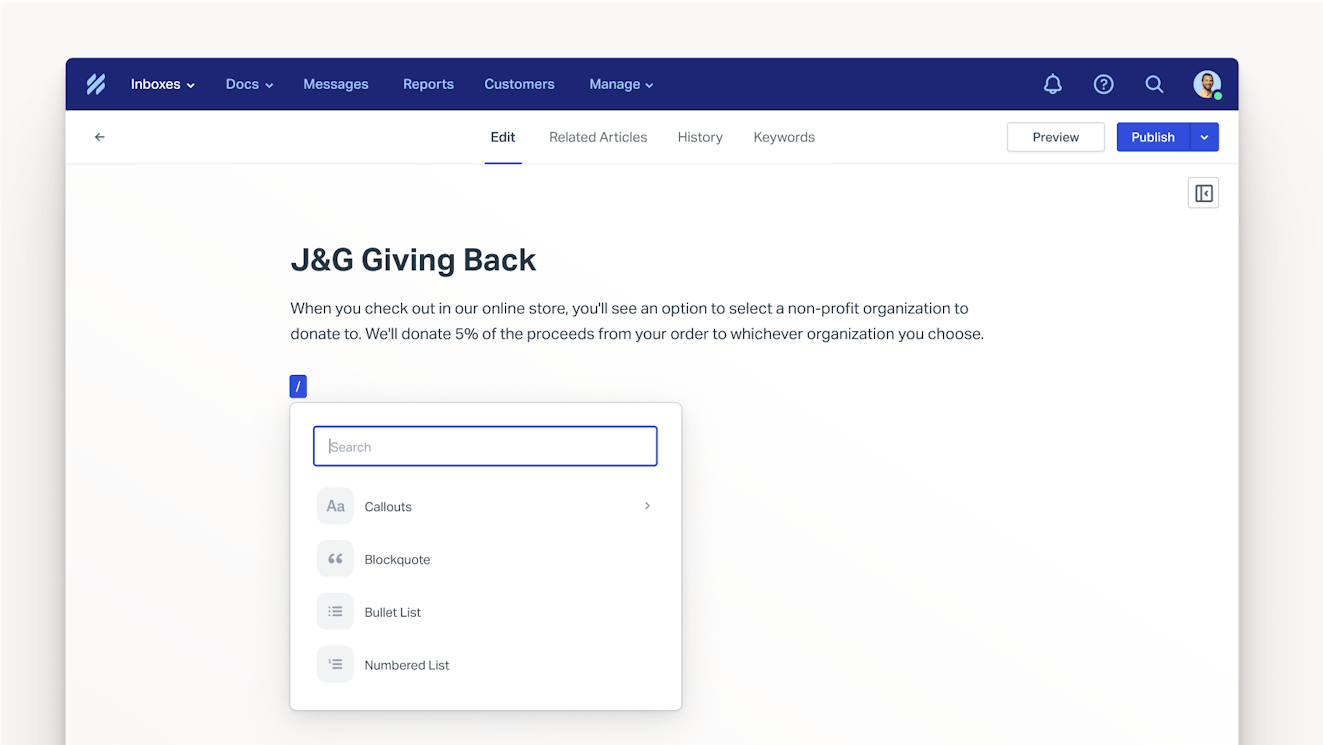
Once published, customers can find the content on your Docs site and anywhere a Beacon is installed. Team members can also easily access and reference Docs from within any conversation window.
Give your team a hand with AI
Help Scout’s AI features are designed to help teams work smarter, not harder. AI Summarize gets you up to speed by creating a bulleted summary of a conversation with one click. AI Assist helps adjust the tone or length of your replies or even translate Docs articles into additional languages like Spanish, French, German, and more.
AI Answers is a smart search assistant that can provide specific answers to your customers’ questions using generative AI and information from your help center.
Make data-driven decisions
Help Scout provides reporting dashboards for all tools available on the platform. Learn things like:
When your customers are reaching out and how many conversations your team is fielding each day.
What channels (email, live chat, knowledge base, etc.) your customers prefer.
Which knowledge base articles are most helpful to your customers and where there are gaps in your content.
Which proactive messaging campaigns are most successful.
What your customers think of your company, products, and customer service.
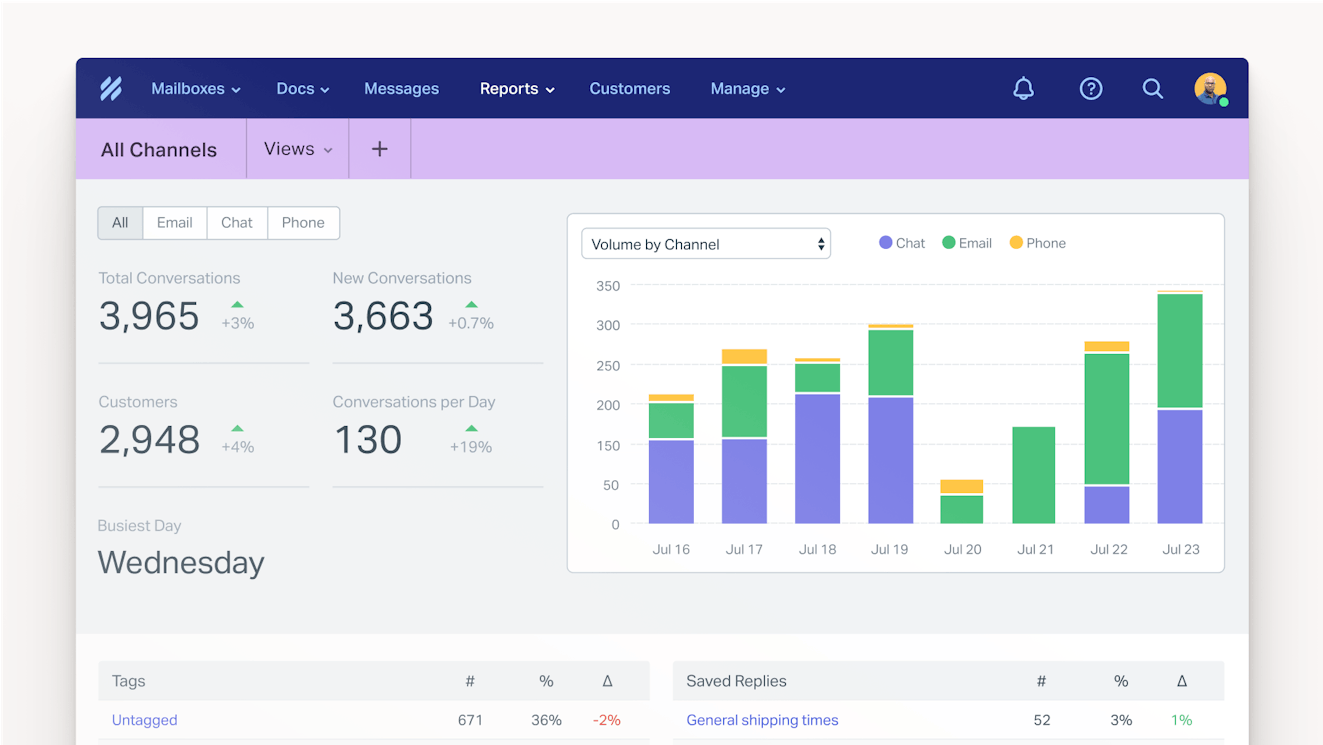
This type of data can help your team make informed decisions on product improvements, staffing, and support approaches, and it can help you increase customer engagement and satisfaction.
Engagement management at the right price
Unlike other tools on this list, which may only handle one aspect of engagement, all Help Scout plans come with tools capable of managing most customer touchpoints. This low-cost approach makes Help Scout an ideal choice for growing businesses.
Price: Free plan available. Paid plans start at $50 per month.
2. Drift
Best customer engagement software for sales and marketing teams.
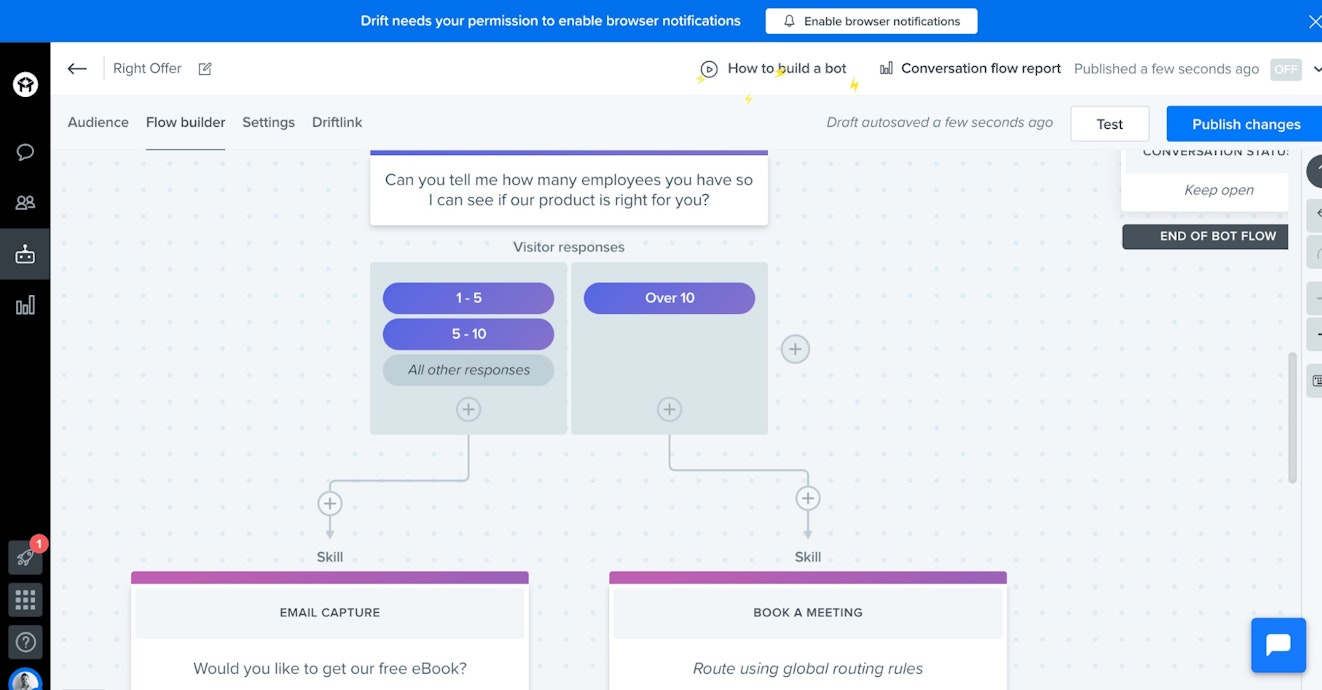
Drift is a platform focused on conversational marketing, sales, and support. Conversations initiated through Drift can be via live chat, video, or email, and the software also supports self-service chatbot flows and integrations with third-party knowledge base software.
The software’s web widget can be installed on any page on your site, making it easy for your team to capture customer and lead information, deliver targeted messaging, and provide proactive support. Drift also offers a landing page builder, in-app meeting scheduling, and reporting dashboards.
One Drift-specific metric offered to subscribers is the “engagement score.” The score is recalculated every 30 minutes based on touch points such as meetings booked, conversations held, videos viewed, and email clicks and opens. The score can help determine which leads are most likely to convert so that your team can budget their efforts accordingly.
Though a very robust and helpful tool for sales and marketing teams, Drift is on the pricier side of conversational software. The only price listed on their site is a whopping $2500 per month, which even beats the entry point for well-known platforms like Intercom. The website does reference a free plan, but the details listed are sparse, and it is unclear what is included.
Price: Free plan available. Paid plans start at $2500 per month.
3. Optimizely
Best customer engagement software for those interested in A/B testing.
Every customer touchpoint is an opportunity to either encourage or discourage future engagement. Optimizely, and specifically its Experiment product, offer the ability to try out multiple versions of a customer touchpoint like a landing page or a product feature and discover which performs better with your audience.
The platform supports low/no code experimentation, allowing you to bypass development resources and design experiments using a WYSIWYG editor. Optimizely’s segmentation tools allow you to tailor experiences to targeted audiences, and the software’s reports provide valuable insights to help inform your team’s next steps.
While Optimizely’s content marketing platform offers a free plan and trial, details aren’t listed for its Experiment tool. Prospective customers will need to reach out for a demo to learn more.
Price: Contact for Experiment plan pricing.
4. HubSpot CRM Suite
Best free customer engagement software.

If you’re looking for a customer engagement platform that can do almost everything, HubSpot might be what you’re looking for. HubSpot is a CRM that offers several products — Marketing Hub, Sales Hub, Service Hub, CMS (content management system) Hub, and Operations Hub — designed to bring all customer interactions together onto one platform.
Using all of the various HubSpot tools, it’s possible to oversee most customer interactions. You can manage customer communications, track support requests, nurture sales leads, create a blog, design email campaigns and manage user lists, run A/B tests on things like landing pages and email messaging, view in-depth reporting dashboards, and much, much more.
Companies can sign up for an individual “hub” plan or opt for HubSpot’s CRM Suite (which includes them all) for free. While the platform’s free plans offer a lot of value, it’s important to note that many of its best features are limited to paid plans.
Price: Free plan available. Paid plans start at $29.97 per month.
5. Mixpanel
Best customer engagement software for reporting and analytics.
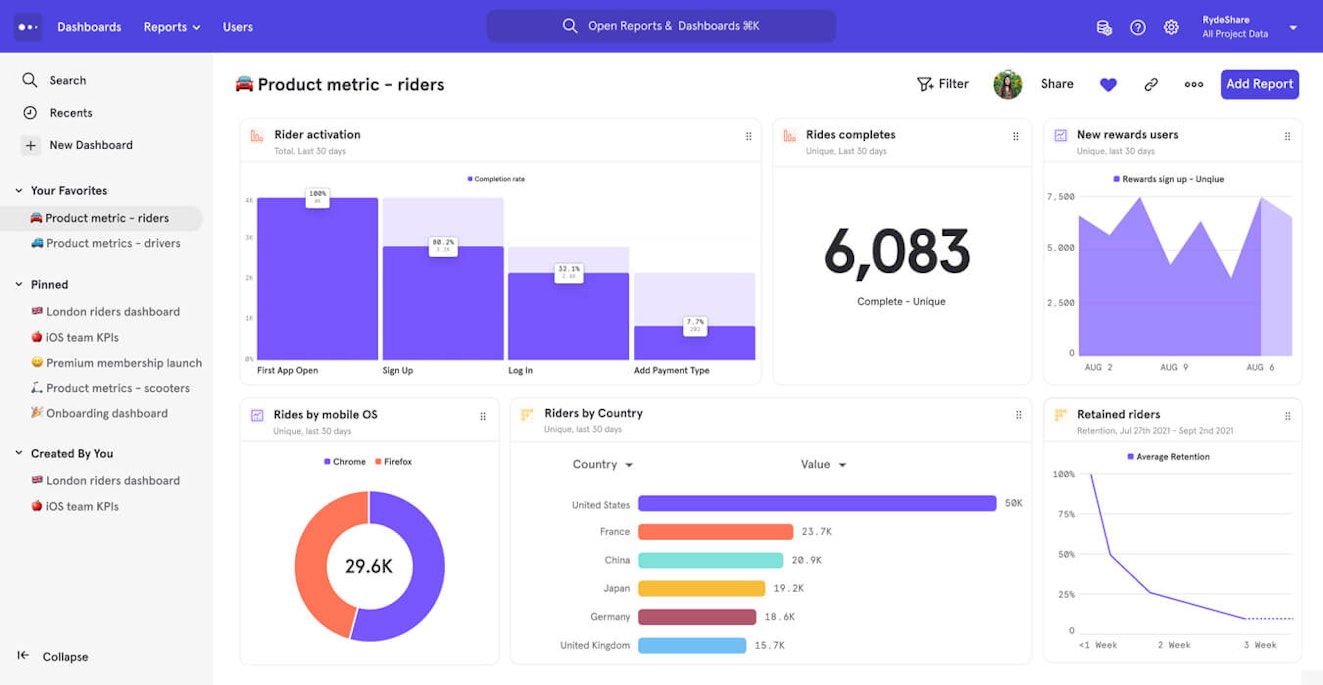
Mixpanel is a powerful analytics platform that helps companies better understand the way that customers interact with their products. Gaining a more complete understanding of customer personas, habits, and behaviors enables businesses to make data-driven product decisions.
The platform can help you learn about your customers’ geographic location, the devices and browsers they use, and how they found your site or product. You can also create “events” for essentially anything on your site or within your app — things like sign-ups, cancellations, app downloads, etc. Tracking events lets you measure customer engagement throughout the entire customer journey, helping you understand what is working, what isn’t, and how you can best use that data to limit friction points and increase retention.
The best part about Mixpanel is that it supports integrations with other popular tools, many of which may already be in your tech stack. Use Mixpanel data to inform email and in-app messaging campaigns, ensuring that your sales and marketing teams target the best audience for their communications.
Price: Free trial and plan available. Paid plans start at $20 per month.
6. Intercom
Best customer engagement software for in-app messaging.
Intercom is a well-known engagement platform that sales and marketing teams use to proactively engage with prospective customers via in-app messaging, chat conversations, and surveys. In recent years, the software has also added customer support features like a shared inbox and knowledge base builder, making it ideal for those looking for a full-service customer communications platform.
Beyond standard engagement tools like live chat, in-app messaging, and the support features previously mentioned, Intercom lets you create and deliver code-free product tours and in-app tool tips. This can be great for teams where developer resources are tight. Users can also create custom chatbots that can automate issue resolution and even chat with customers in multiple languages.
Intercom is a powerful platform that has a lot to offer; however, it doesn’t come cheap. Many of its best features are part of higher-tiered plans, and even the Starter plan is fairly steep at $74 per month. It’s a great option for enterprise teams, but if you’re working with a smaller headcount or budget, you might consider a more affordable alternative.
Price: Free trial available. Paid plans start at $74 per month (includes two seats).
7. Kangaroo
Best customer engagement software for loyalty programs.
Kangaroo is a loyalty and rewards platform. It helps companies reward positive customer behavior, encouraging engagement, acquisition, and retention through gamification.
The platform has a tiered pricing plan, adding additional features and services to each tier. Users can roll out programs on the lower tiers like reward points and redemption, coupons, referral campaigns, social sharing rewards, eGift cards, and raffles. Higher-tiered plans incorporate additional functionality, including email and SMS marketing.
Kangaroo provides reporting that helps you understand customer behavior to better optimize your campaigns and increase their success. In addition, it offers integrations with many ecommerce and POS (point of sale) systems, making it easy to enroll and reward customers as part of your existing customer flow.
Price: Free trial available. Plans start at $59 per month.
8. ConvertKit
Best customer engagement software for email campaigns.
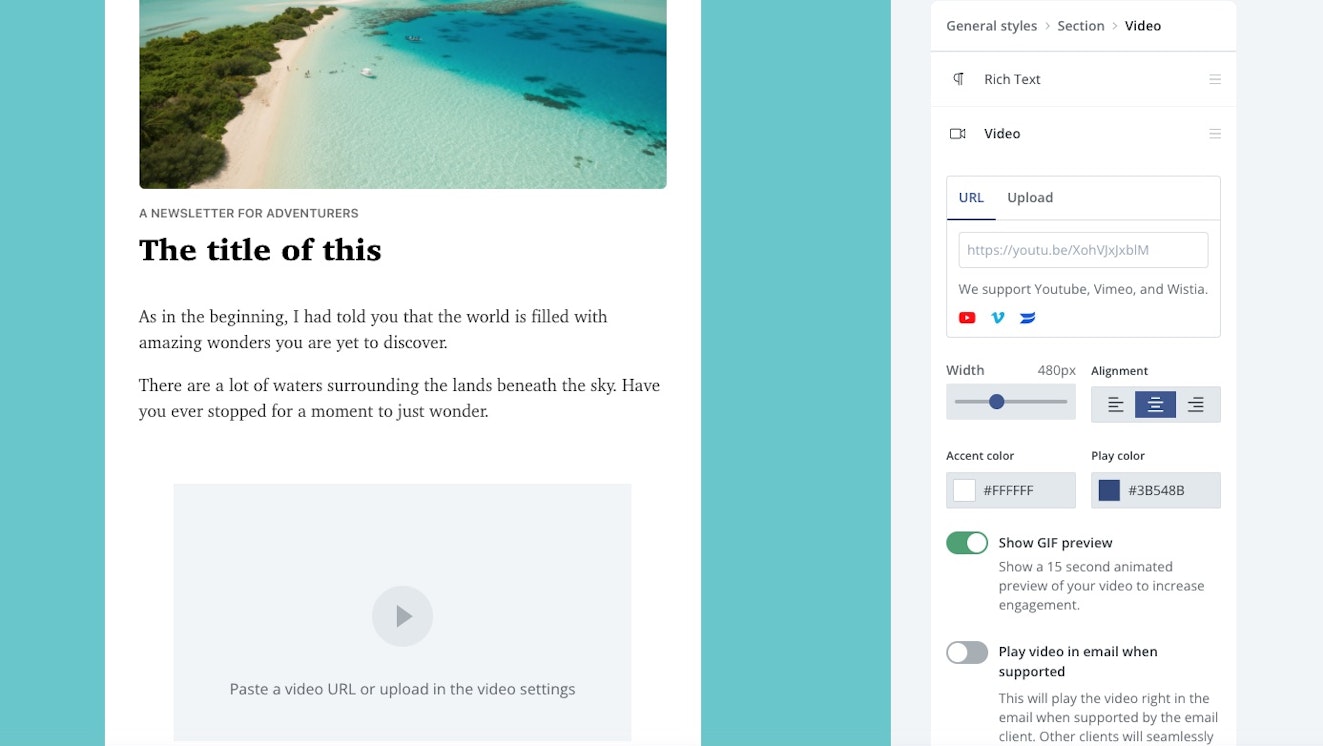
ConvertKit is a marketing automation tool that is a favorite for creators — think podcasters, authors, photographers, musicians, etc. The platform focuses on email marketing with a clean, code-free email designer and text editor. ConvertKit integrates with Unsplash, giving teams access to thousands of free stock images for use in their content. Add clickable CTAs and create unlimited templates that are responsive across devices.
A unique aspect of ConvertKit, and possibly the reason it is often preferred by creators, is its monetization features. Create a paid newsletter, sell an ebook, or receive tips using ConvertKit’s payment processing integration. Combining the platform's other tools with the ability to accept payments and deliver digital products streamlines the path toward creating simple sales funnels that help creators get paid for doing what they love.
The platform is very affordable, as the free plan offers a lot of value right out of the gate. However, those interested in more advanced features like automation will need to move up to a paid plan. In addition, potential customers should note that pricing tiers are dependent on subscribers, meaning that as your audience grows, your monthly cost will also rise.
Price: Free plan available. Paid plans start at $9 per month.
9. Zendesk
Best customer engagement software for teams with development resources.

Zendesk is an omnichannel communications platform best known for its customer support tools. Zendesk allows teams to manage service requests via all major channels (email, live chat, voice, SMS, and social media) through a unified workspace. In addition, Zendesk Suite plans also allow you to create a customizable help center, host a community forum, and access Answer Bot, the platform’s chatbot feature, which can provide customers with instant answers.
Beyond support, Zendesk also offers plans geared toward sales teams. These plans offer customizable sales pipelines, email management, calendar integration, task tracking, sales forecasting, goal tracking, and more.
Support and Sales plans come with comprehensive reporting dashboards and support integrations with a wide variety of software platforms, and they are built on Zendesk Sunshine — a CRM platform that brings all of your customer information into one place.
One thing potential customers should be aware of is that Zendesk can be challenging to set up and maintain. Given that fact, it’s probably a better choice for enterprise companies that have the development resources needed to implement and maintain the platform successfully.
Price: Free trial available. Plans start at $19 per month for Zendesk Support and $20 per month for Zendesk Sales.
If Zendesk is close to but not exactly what you're looking for, find similar options in our list of the best Zendesk alternatives.
10. Typeform
Best customer engagement software for creating surveys and quizzes.
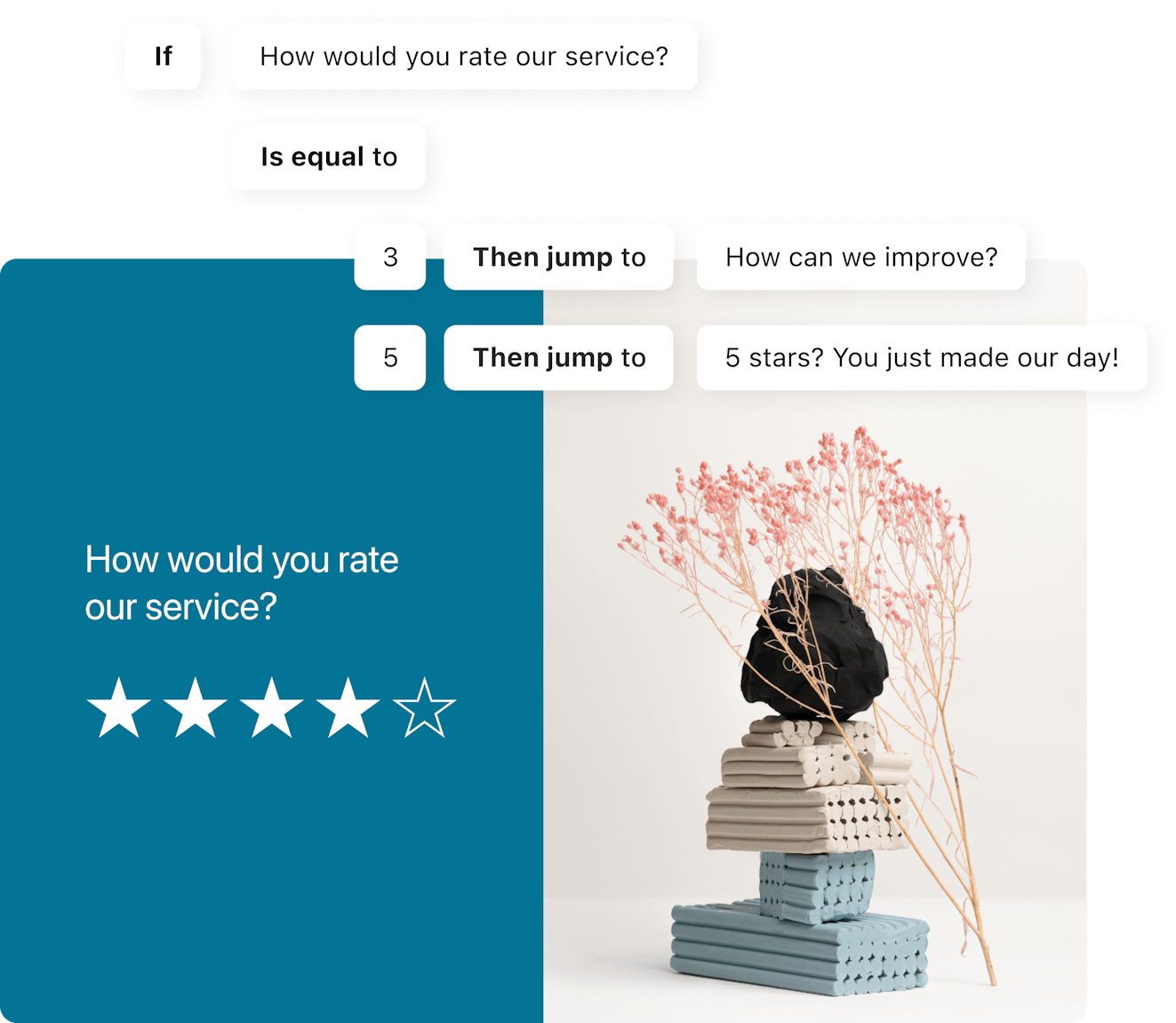
Typeform is software dedicated to helping companies make better forms. While the term “form” doesn’t necessarily elicit thoughts of creativity, Typeform helps you create beautiful forms that your customers will want to answer, with no development skills required.
The platform offers a library of colorful templates that can be easily customized and embedded into your website, shared via an email campaign, or linked to in a social media post. Once users interact with your form, use Typeform’s reporting dashboards to view results, generate shareable reports, and export to other tools for additional analysis.
There are many use cases — order forms, feedback forms, customer surveys, quizzes, sign-up forms, and evaluation forms, to name just a few. You can even use Typeform’s condition-based logic to create free or gated products. Given its versatility, the software is an excellent tool for those looking to increase user engagement in new and exciting ways.
Price: Free plan available. Paid plans start at $25 per month.
11. Pendo
Best customer engagement software for creating in-app guides.
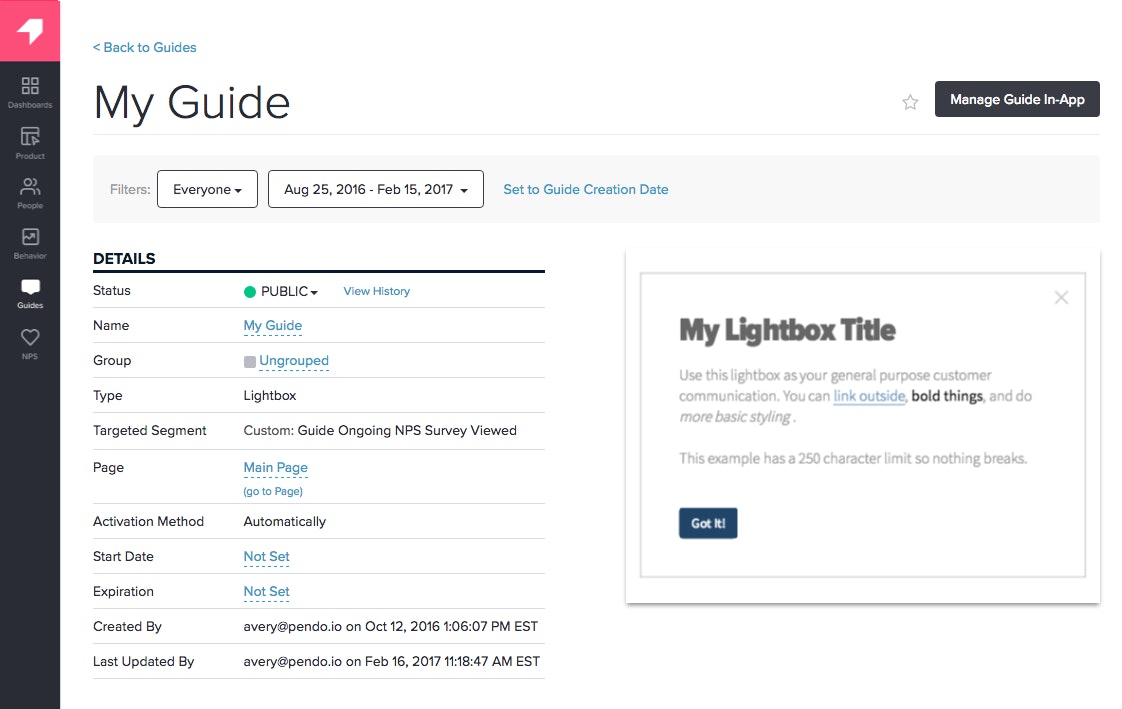
Pendo is a product engagement platform focused on helping businesses provide better customer experiences through analytics, in-app guides, surveys, and road mapping.
The platform’s analytics serve a similar purpose to Mixpanel’s — they allow companies to better understand user behavior and visualize user paths as well as facilitate user database segmentation, helping your team achieve maximum impact. Pendo also helps you measure customer sentiment through NPS surveys, and it supports integrations with other apps such as CRMs, business intelligence platforms, and product tools.
Beyond its feedback and analytical features, Pendo offers the ability to create in-app guides within your product, similar to Intercom's. The guides don’t require any developer lift and can help with essential points in the customer journey, such as onboarding.
Prospective customers should note that not all features are available across all plans. Features such as NPS and integrations are missing from the free and Starter plans. In addition, these plans also have limits on the allowed amount of monthly users and length of data retention. Given that Pendo’s price point is already quite high, the absence of these features may be a deal breaker for those with smaller budgets.
Price: Free plan available. Paid plans start at $583.33 per month (paid annually).
12. Forumbee
Best customer engagement software for self-service.
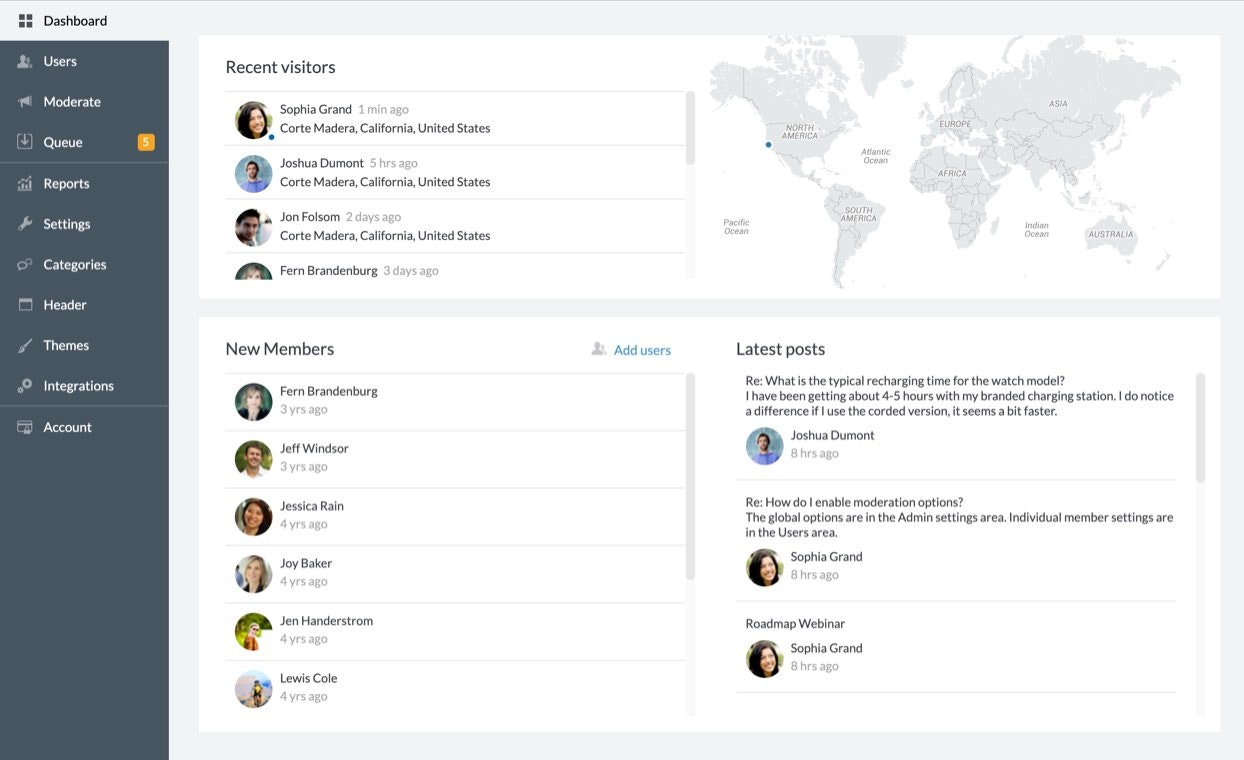
For those focused on self-service and community, Forumbee is an obvious choice. The platform allows you to create internal or external knowledge bases and community discussion forums that help your customers quickly get the information they need.
The knowledge base component has all of the features you would want in a knowledge base product — an easy to use editor, the ability to create a hierarchical structure for your content, team roles and permissions, and the ability to customize your help center.
Forumbee’s community options come in two forms: a discussion forum and a Q&A forum. Both allow customers to interact and crowdsource knowledge. Users can create member profiles, @mention and quote other users, receive notifications for new messages, highlight contributions, share a calendar, and utilize direct messages.
One thing that does make the Forumbee products a little different is that instead of being limited to marking content as internal or external, you can create private areas for specific teams or clients, restricting their access by user, group, or domain.
Forumbee is another platform that smaller teams may find expensive. It’s a good option for those focused on self-service and community, but if you’re looking for a more comprehensive approach to engagement, there are more cost-effective options on this list.
Price: Free trial available. Plans start at $250 per month.
How does a customer engagement platform work?
A customer engagement platform is software capable of managing many (or all) of the functions above within the same system. Some of the benefits of going with a consolidated system are that it:
Provides a more holistic view of your customer. You get a full picture of your customer and where they are within the customer journey without switching between multiple applications.
Saves time and increases productivity. Teams can automate some of the less sensitive work required to engage with customers, allowing them to scale their efforts without needing additional headcount.
Facilitates in-depth analysis via first-party data. Having native functionality means you don’t need to rely on integrations or manual reporting to analyze customer data.
What to look for in a customer engagement platform
If the thought of having all of your engagement tools in one place is appealing, here are some core features that should be part of any customer engagement platform.
1. Segmentation
The best way to strengthen your customer relationship is to ensure that your company engages with the right customers at the right times. Look for software that can segment your user database by customer demographics, behaviors, or where they are in the customer journey.
This will allow you to personalize your communications to customers, increasing the likelihood of engagement.
2. Communication tools
Customer engagement platforms should have native tools to help you communicate with customers across all relevant channels. This includes email, live chat, social media, phone, knowledge bases, and, if it’s essential to your business strategy, AI tools like chatbots.
Outside of these channels, which are often heavily utilized by support teams, you may also want to look for platforms that support proactive outreach, such as email campaign tools and in-app messaging services.
3. Issue tracking
While customer engagement doesn’t equal customer support, there is some overlap. If a customer replies to a marketing email with a product issue, you want to ensure that there is an easy way to move the request over to your customer service team.
A customer engagement platform often has ticketing capabilities that allow your team to document customer issues and track them through to resolution.
4. Feedback
A great product can’t be created in a vacuum, nor can a good relationship with your customer. A good engagement platform will have tools for soliciting, collecting, analyzing, and responding to customer feedback.
5. Automation
A benefit of having all of your customer engagement tools as part of a singular platform is that it opens the door to creating complex automations that allow you to better engage with customers at scale.
Some examples of possible automations:
Surfacing a notification within your app announcing the release of a bug fix to all customers who reported the issue to your support team.
Sending a survey to users who use a specific product feature at least once a week.
Sending an email to all customers who read a specific blog post on your website and made a purchase within the last three months.
6. Reporting and analytics
When it comes to product and business decisions, instinct is nice, but data is best. Your customer engagement platform should come with robust reporting and analytics tools capable of providing insights into who your customers are, what they value, how they use your product, how they view your brand, and how they communicate with your teams.
Given that many folks around your organization will likely need (or want) to view these insights, look for software that offers free licenses for “read-only” users or platforms that can automatically send out reports to stakeholders on demand or at a pre-set cadence.
7. Integrations
While having a customer engagement platform that can manage every aspect of the customer journey natively would be nice, it’s not always possible. When shopping for an engagement platform, look for a system that can easily integrate with the other players in your company’s tech stack.
Moving forward
Building a good relationship with your customers and increasing customer engagement can be challenging, but it’s not impossible.
With the right tools, a personalized approach, and a customer-centric mindset, your company can earn a place in your customers’ hearts and at the top of their crowded inboxes.
If you’re ready to give customer engagement management software a try, Help Scout offers a free trial and offers plenty of resources to help get you started.






